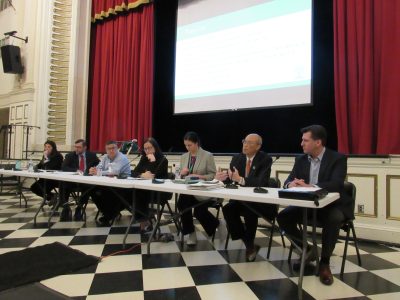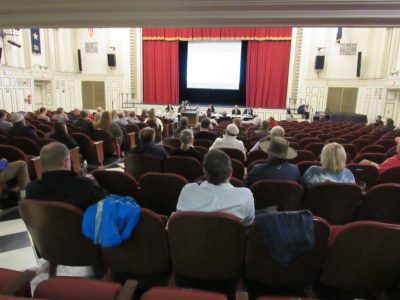Mixed Reaction to Pleasantville Schools’ $15M Capital Project
News Based on facts, either observed and verified directly by the reporter, or reported and verified from knowledgeable sources.

More than 60 people attended a Pleasantville School District public forum last week and expressed both displeasure and support for the proposed $15 million capital project.
Residents will decide on Dec. 17 whether to authorize the district to borrow up to $13 million and use $2 million from the district’s capital reserve fund and fund balance to pay for the work.
Board of Education members sat at the front of the high school auditorium for the three-hour-plus forum last Tuesday evening. They were joined by Superintendent of Schools Dr. Tina DeSa, Assistant Superintendent for Business John Chow and environmental engineer Steve Lauria of the consulting firm Woodard & Curran.
A presentation explained the scope of the work, called the Pleasantville Forward Capital Project. Among the project’s upgrades and renovations are resurfacing the main field turf, replacing the track, adding bathrooms and a concession area, lighting the main field, installing turf for the practice field area, adding lights to the newly-turfed practice field area, adding fencing and netting and replacing the rubberized surface at the Bedford Road Elementary school playground.
Objections were raised about the tax hike, which is expected to be $167 a year for the first two years of the 15-year bond for homeowners with an average assessment. The additional tax would go into effect for the 2027-28 school year, Chow said.
Resident Joe Stargiotti argued that the tax increase would likely be far greater than $167.
“The problem is we have a number of condominiums so when you take an average of the people who live in houses, they will be paying a lot more than $167; they are going to be paying $200, $225, $250,” Stargiotti said.
He compared the proposed bond to a “bait and switch,” where taxes would remain high for the length of the bond and not be reduced. Expiring debt after the first two years would negate the average increase from the bond, district officials have said.
Stargiotti asked if the district could guarantee taxpayers would only see a $167 hike for two years and not for the length of the bond.
Chow explained that debt service is one line in the district’s budget.
“If we go with this plan, the 2029-30 year, that line will be reduced by $1 million,” Chow said. “The first payment of the bond’s principal plus interest will be due in the 2027-28 school year and end by the 2029-30 school year when the district’s annual debt payments will decrease by $1 million.”

Trustee Michael Busch also addressed Stargiotti’s concern.
“There’s no such thing as a tax reduction,” Busch said. “A new budget is passed every year. If the expenses are less by $167 a year, then we are not going to ask for that additional $167, but the rest of the budget could still go up. So you may see the tax increase regardless.”
Some residents objected to how the project has been rushed through without closely examining each upgrade and renovation. Arguments were made to break out various items to potentially reduce the tax impact.
“Couldn’t people simply vote for the things that they wanted by going to the ballot box without going through a convoluted process of committees, meetings and forums and just a straightforward line-by-line item to vote for what you’re interested in?” resident Lauren Lowder asked.
Board President Erin Ballard said the board has “the responsibility to present a package we feel will meet the needs of the community.”
Former longtime trustee Emily Persons agreed with Ballard, explaining that the work is too interconnected to consider items on a piecemeal basis. She said she appreciated how the current board has maintained the district’s facilities.
“Our bonds are always within means,” Persons said. “If you look at other school districts, they have not maintained their facilities and their bonds are well over $15 million, and many of those school districts are not able to pass those bonds.”
Stargiotti requested the board consider a de-coupling resolution at its next meeting.
Re-turfing the high school main field and turfing the practice field drew mixed reaction. Lynda Natale, a parent of a high school senior, favored re-turfing. She said her son played at Parkway Field and was coughing up dirt afterward, becoming dependent on inhalers.
“Think about what those effects will have on your students you’re trying to safeguard and protect,” Natale said.
But Michael Inglis, a Pleasantville Conservation Advisory Council member, warned that artificial turf contains a multitude of chemicals.
“It is a plastic-based product that has known carcinogens,” he said.
Lauria said the recommended turf would not use infill made from recycled tire particles, which are found in many artificial surfaces. Artificial grass infill is any product placed between the surface’s fibers. An option with natural infill is favored, Lauria said.
He noted that the selected turf product was free of PFAS – perfluoroalkyl and polyfluoroalkyl – substances known as forever chemicals.
“We will work with manufacturers that will provide certification that the infill is PFAS-free,” Lauria said. “We want to use shock pad material surfaces that are as safe as possible by using the best-performing shock pad on the market.”
He added that surface performance, good environmental conditions and player safety were priorities when designing artificial turf.
Other concerns included potential noise and light pollution from the new lights.
Lauria acknowledged that lighting is an important issue for residents living near the campus.
“We consider glare, spillage, bird habitat, including impacts on bird migration,” Lauria said. “A high-end system is part of the proposed project that has minimal to no glare.”
New field lights will be DarkSky certified, a program focusing on minimizing light pollution, he added.
Lowder raised the issue of nighttime sound pollution from the fields and how sound reverberates into the surrounding neighborhood. Many families in close proximity have young children with early bedtimes.
“Our children need to go to bed at seven or eight o’clock at a time this community is telling us we need to keep playing games,” Lowder said. “I haven’t seen any thinking that has taken this into consideration.”
Ballard said the board wants to understand more about the impacts of games being played at night and will weigh suggestions regarding light and sound pollution.
“There are more intense issues during the evening,” she said. “I think there’s some work we have to do about trying to improve the situation.”
The project does not include a new public address system, Lauria said.
DeSa said the public’s questions and reaction were anticipated.
“Our community forum that we planned was what we expected,” DeSa said. “It was a great opportunity for us to continue to share information and create a space for a two-way dialogue for the community.”
The next Board of Education meeting is scheduled for Tuesday, Dec. 3 at 7:30 p.m.
Voting on the bond will take place on Dec. 17 from 6:30 a.m. to 9 p.m. in the Pleasantville Middle School multipurpose room.

Abby is a seasoned journalist who has been covering news and feature stories in the region for decades. Since The Examiner’s launch in 2007, she has reported extensively on a broad range of community issues. Read more from Abby’s editor-author bio here. Read Abbys’s archived work here: https://www.theexaminernews.com/author/ab-lub2019/
